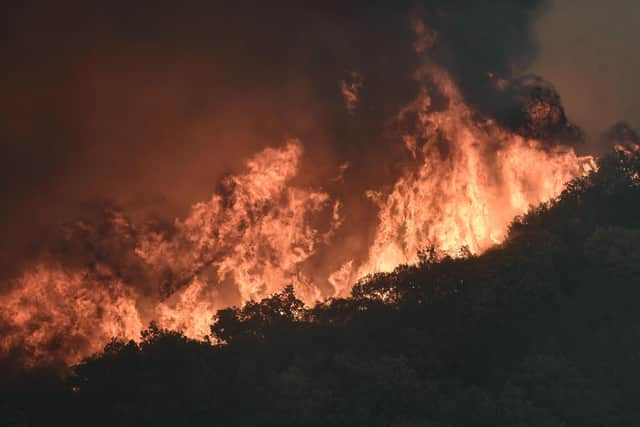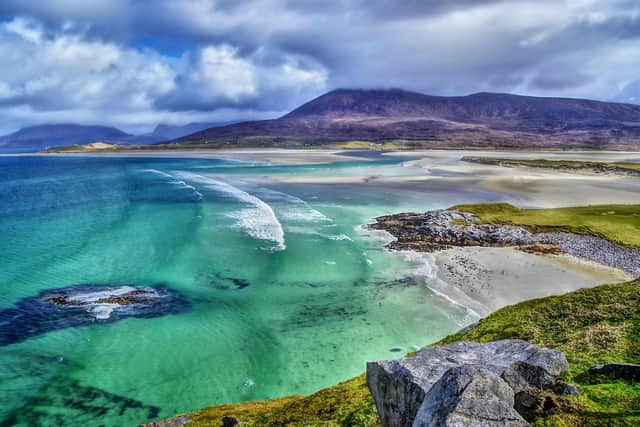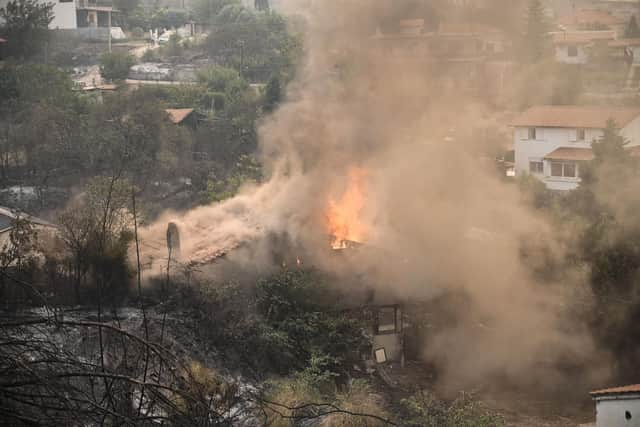Climate change: Will heatwaves, hurricanes and wildfires in Europe upset foreign holiday travel plans for Scots?
This summer has seen record-breaking high temperatures across the globe, with July the planet’s hottest month since monitoring began.
Europe, north America and Asia have been baked by scorching heatwaves and droughts.
Advertisement
Hide AdAdvertisement
Hide AdThermometers have soared way above 45C in some places – one particularly severe hot spell was even named after Cerberus, the mythological gatekeeper of hell – and parched conditions have sparked a relentless series of deadly wildfires.
Greece, which has been particularly badly hit, has been battling the largest single wildfire ever known in the European Union for the past fortnight as it rips across the north-east of the country.
Even the oceans have been warmer than usual, with an unprecedented heatwave in UK waters.
And increasingly strong hurricanes have been causing chaos in the Atlantic, flooding coastal communities and destroying homes and livelihoods in the likes of Florida.
Weather experts say climate change is a key factor driving the extreme conditions.


Mediterranean diet: Could olive oil, lemons and tomatoes drop off the UK menu due to climate change?
Geographer and climate change scientist George Gunn, associate researcher at the University of the Highlands and Islands, said rising global temperatures and the consequences were here to stay.
“Earth’s atmosphere is warming up due to climate change and this is causing our weather to be ever more extreme,” he said.
“More events like droughts and heatwaves have recently led to tinder-dry conditions in many countries, which is ideal for wildfires to start and to spread.


Advertisement
Hide AdAdvertisement
Hide Ad“These events are a warning of what’s to come. This is likely to happen more and more often.
“If current global warming continues, many parts of the world will become uninhabitable and more places will be subject to increasingly frequent extreme weather.”
Few will have missed terrifying footage showing forests and hillsides ablaze, homes being engulfed by flames and menacing clouds of ash and smoke filling skies as many parts of Europe, Canada and the US were turned to cinders and local residents and holiday-makers fled for their lives.
The images will remain burned into minds for a long time to come and could influence future travel choices, with people possibly avoiding the worst hotspots and looking for greener options. Or will they?


It’s a complex picture, according to Professor John Lennon, director of the Moffat Centre for Travel and Tourism Business Development at Glasgow Caledonian University.
He said he believed extreme weather would have an impact on the holiday industry, but perhaps not as much as one might imagine, especially with pent-up demand in the wake of the Covid pandemic.
“We have seen hugely negative effects of climate change, which is evidenced very clearly in the last couple of years with the increases in temperature and the kind of follow-on impacts of that, such as fires,” he said.
“We've all seen those tragic images of Mediterranean and American locations alight and the devastation those fires are causing, from Hawaii to Canada and from Greece to other parts of the Med.
Advertisement
Hide AdAdvertisement
Hide Ad“Those are going to have very powerful impacts on the future traveller, and people will, I suspect, look again and think again.”
However, he has argued Brits and other northern Europeans cannot resist the lure of “heat and humidity” and would continue to head for the sunniest climes.
“In tourism terms, we know from research that the visual is a key catalyst for people wanting to visit a place,” he said. “Tourism marketing is all about imagery. It's not about narrative. It's about pictures and video.
“I think tourists have seen and stored the memory of some of the effects of climate change. Will that impact on visitation? Yes.
“However, up against that you will have all of the engines of tourism marketing in those countries, seeking to get visitors to return. They won't be showing the pictures of fires, will they?
“There will be blue beaches and white sands and all of those images that we in chilly north-west Europe seem to be called towards.
“I think the appetite for heat and humidity seems to be enduring. Let’s take Dubai, for example. The largest inbound market to Dubai is the UK.
“The thing you get with certainty in Dubai is heat and humidity. If people are going to Dubai, they are going to keep going to Italy and the south of France and north Africa.
Advertisement
Hide AdAdvertisement
Hide Ad“Even though these dreadful images we talked about do have an effect, memory is quick in tourism. It fades, and that blue sky, beautiful turquoise sea and white sands will replace it.”
Despite research suggesting eco travel and sustainable tourism are likely to grow, Prof Lennon said the reality was people were jumping back on planes faster than before.
“Tourists are fickle and easily influenced, and their consumption habits are curious,” he said.
He has advocated stay-cationing as the most sustainable option for a getaway, with a much smaller environmental footprint than international breaks.
And he may be biased, but he said he believed his homeland had everything any holidaymaker could want.
“Scotland is for me a country of huge variety and potential for tourists to discover – more than 700 islands, the Highlands, the Lowlands, great cities, coast, rural getaways, mountains,” he said.
“The beauty of Scotland is the proximity of the contrasting natural heritage, in my view.
“I think the job here is when we're thinking about holidays to think first about discovering our own country – and I don't just mean Scotland, England has much to offer as well.”
Advertisement
Hide AdAdvertisement
Hide AdHe warned that governments and travel operators across the world would have to pay bigger attention to climate change in the future and take action to mitigate the worst impacts.
Mr Gunn agreed, contending that people would “vote with their feet”, which will have repercussions on countries where the holiday trade is the mainstay of society.
“This will rock economies abroad which are dependent on tourism and impact travel plans,” he said.
He also cautioned that Scots at home should get ready for an increase in domestic visitors and prepare for the impacts on infrastructure and the environment.
Comments
Want to join the conversation? Please or to comment on this article.